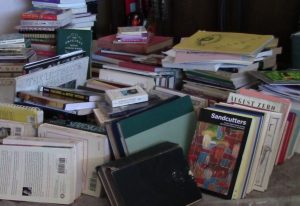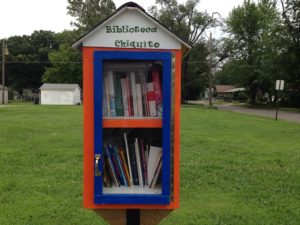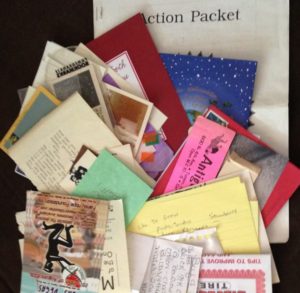 When it comes to books, people have very definite opinions. We carefully choose, read, and savor each and every book that comes into our home. Some people even consider characters to be another form of friend. Books can represent knowledge, status, and hold memories of the first time you read a story – or the time you re-read it during an emotional time of your life. All of that makes it that much harder to contemplate sorting through your books to decide whether to remove them from your library.
When it comes to books, people have very definite opinions. We carefully choose, read, and savor each and every book that comes into our home. Some people even consider characters to be another form of friend. Books can represent knowledge, status, and hold memories of the first time you read a story – or the time you re-read it during an emotional time of your life. All of that makes it that much harder to contemplate sorting through your books to decide whether to remove them from your library.
Break it Down
If you’re like us, your library may be considerable. We do know people with much larger libraries than ours, which can make the prospect of sorting seem overwhelming. In that case, we recommend dividing your books into categories. It’s what worked for us.
Since we accumulated most of our books together, we worked through the sorting together. In your household it may make more sense to let each family member sort through their own library, offering your support as witness and advisor if needed.
If you need to break down your book sort further, consider the following categories as suggestions:
- Fiction
- Non-Fiction
- Reference
- Professional
- Cookbooks
- Hobby-related books
You can further break down each category as needed. For example, separate fiction into different genres, or cookbooks into different cuisines. We suggest using the largest divisions you feel comfortable sorting, to keep the number of sessions to a minimum.
We sorted our books in three separate sessions. First, we tackled our general library: fiction, non-fiction, reference, poetry, etc. Then we sorted through our sexuality and erotica titles. Lastly, Johnnie sorted through the cookbook collection.
Making the Decisions
 As mentioned above, books can hold sentimental and emotional value beyond the original price paid. It can be extremely difficult to detach from those intangibles in order to be okay with getting rid of any specific title. Multiply that by all the books on a shelf and you’re looking at an intense experience. That’s one of the reasons we recommend starting with other items in your home before tackling your library. We had processed low-hanging fruit, entertainment, electronics, and clothing by the time we sat down with our books.
As mentioned above, books can hold sentimental and emotional value beyond the original price paid. It can be extremely difficult to detach from those intangibles in order to be okay with getting rid of any specific title. Multiply that by all the books on a shelf and you’re looking at an intense experience. That’s one of the reasons we recommend starting with other items in your home before tackling your library. We had processed low-hanging fruit, entertainment, electronics, and clothing by the time we sat down with our books.
The things we learned in making decisions about those earlier categories also applied to our book sort. We’d learned to detach from sentiment to decide what we actually use. We’d also learned to embrace the idea that items that we don’t use could be enjoyed by others if we could only bring ourselves to let them go. With books that latter notion is vital. If you enjoyed a book in your past, why deny others the opportunity to experience it? Sure, there are certain beloved books that you read every year and can’t imagine letting go, but many books in your library you only read once or twice and then leave on the shelf.
With books there’s another thing to consider: can you get the information elsewhere? This is especially true of “how to” and reference books as well as cookbooks. Articles, blog posts, videos, and even apps exist that provide the same information we historically found in books. This is why few people still use physical dictionaries, publishers stopped printing encyclopedias, and almanacs have moved to digital formats.
Digital Options Abound
As you make decisions about what books to keep, remember that there are digital options available. Even the most dedicated bibliophile might want to consider the fact that they can purchase digital copies of at least some of their library to free up physical space in their life.
What are some of the advantages to digital books over physical copies?
- You can hold hundreds of books in an e-reader, tablet, smartphone, or your computer
- You can quickly search for specific passages or quotes in any digital book
- You can adjust the font, size, and even page color in order to make the book easier to read – and you can change those settings whenever your environment changes
- With cloud storage, you can start reading a book on an e-reader and then use your phone app to pick up in the same place you stopped.
You can purchase copies of digital books from a variety of places, but did you know there are thousands and thousands of titles available for free? There are public domain books available from Project Gutenberg. You can “buy” free books from iTunes, Amazon, Google, etc. You can even download free books directly from some author websites.
If you are able to pay full price for books, please do so as that directly affects the income of the authors who created them. If not, there are plenty of options for getting discounted copies of books through top sites like Bookbub and Amazon.
Borrow Instead of Buy
It is easy to let go of books when you know you can borrow them whenever you want to read them. There are a couple of long-standing book series (one has over 20+ books) that I borrow from my local library every year. Many libraries offer digital borrowing as well as physical books, so you can choose the format you prefer.
 You may have noticed in the past few years the growing “little free library” movement. These are small hutches placed in someone’s yard or outside their business that are filled with books. You are free to borrow a book and return it when you are done or to replace it with a book you already have. This is all done on an honor system. You can find a directory of some of these libraries here: https://littlefreelibrary.org/
You may have noticed in the past few years the growing “little free library” movement. These are small hutches placed in someone’s yard or outside their business that are filled with books. You are free to borrow a book and return it when you are done or to replace it with a book you already have. This is all done on an honor system. You can find a directory of some of these libraries here: https://littlefreelibrary.org/
Another option is to seek out coffee shops, restaurants, or non-profit organizations that may have a lending library on site. It may be just a few shelves of books or it may be an entire wall or room. These operate on the same honor system as the neighborhood libraries though some organizations may have you “check out” books the same as a public or school library.
You may also want to rethink how you use your local used bookstore. Most will buy books as well as sell them and usually offer store credit that is worth more than the cash price. Start by taking the books from your sort and “sell” them for store credit. Then use that credit to purchase a few new titles. Once you’ve read them, take them back for store credit. Repeat as frequently as you choose.
One last idea: set up a book swap with your friends or through an organization or club. Everyone brings a bag or box of their books that they are ready to part with and then swap for books they haven’t read. This can easily turn into a social event like a potluck or be incorporated into a book club. If you create a swap circle, you could hold monthly or quarterly swaps with each member taking turns hosting the group.
Releasing Your Books
Selling off books for cash instead of store credit is a favorite option for many people. In addition to used book stores, there are online sites that specialize in selling books or you could use sites like Craigslist and Ebay or apps like LetGo. If you belong to a club around a specific hobby or topic, you could offer to sell related titles to other members. You might also just hold the books for a big garage sale after your sorting is done. If you have antique books or rare titles, you may want to consult an expert as to their value before attempting to sell them yourself.
When donating books, your choices are nearly unlimited. Start with the usual charitable suspects: shelters, hospitals, assisted living facilities, and any charities that use rummage sales or thrift stores to raise funds. Look for organizations that provide libraries to their members. For instance, the Phoenix women’s resource center has a business and career library. Check if any of your friends are looking for free books to read or post them for free on Freecycle or Craigslist.
My personal favorite option for donating books is my local library. When they receive book donations they first check if a title is on their acquisition list. If so, it will end up in circulation to be enjoyed by countless other patrons. If not, it will be sold at the periodic book sales or in the book boutique to raise funds for the library. Given how many libraries are struggling to stay open due to loss of government funding, anything we can do to keep them open is worth pursuing.
You may find that you have books that aren’t suitable for selling or donating. They may have broken bindings, missing pages, stains or tears, etc. Before you dump them in the trash, consider a creative alternative. Seek out a local collage or altered book artist and see if they need supplies. You can also inquire if school or community arts programs can use old books for their classes.
Hidden Treasures
 An unexpected outcome of our library sort was the treasure trove we found hidden in the books. As you sort each book, make sure to flip through the pages to see if there are stray items inside. This is the equivalent of checking the pockets of clothes before you donate them.
An unexpected outcome of our library sort was the treasure trove we found hidden in the books. As you sort each book, make sure to flip through the pages to see if there are stray items inside. This is the equivalent of checking the pockets of clothes before you donate them.
We didn’t find any money this time, but we have in the past. We did find some of our favorite bookmarks that we thought we’ve lost and even old photographs. Other things you might find in books include receipts, letters, postcards, stray papers, event programs, pressed flowers or leaves – pretty much anything that you might stick in a book to use as a bookmark. Johnnie uncovered an event program from the early 1990s that was signed by Gloria Steinem. They thought they had lost it forever, but there it was, in the middle of a book. While you may not find a comparable treasure, you will likely find something interesting.
We’ll be releasing videos of our library sort in the near future, so check back here or subscribe to our YouTube channel to be notified when they are live.
Please share your own stories of sorting through books and let us know what criteria you used for choosing what to keep or give away as well as any suggestions you have for donating or selling books. Leave a comment below or share on social media using #RadicallyReducing.
What book would be the hardest for you to give up?